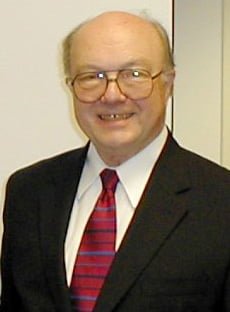“The Cold War ended before the Soviet Union collapsed,” said Jack Matlock Jr., a Greensboro native and previous U.S. Ambassador to the Soviet Union, during his speech on Reagan and Gorbachev on Sept. 23.
In his speech, Matlock focused on the connection between Reagan and Gorbachev, explaining how the relationship between the two leaders led to the end of the Cold War.
He began the speech by saying that “I consider [Gorbachev] to be one of the greatest statesmen of the 20th Century.” He also spoke of the differences between the two leaders. Gorbachev, he said, was a student of law, considered “safe from the system that created him.” In speaking of Reagan, Matlock talked of how he was more a leader of the people, an actor elected as leader of the U.S. Despite the differences between the two leaders, both vied for peace, said Matlock.
Matlock also said that the goal of the United States under Reagan was to change the behavior of the Soviet Union, not break it up.
After 1985 the stance between the two nations changed with the advancing relationship between the two leaders. Reagan and Gorbachev were trying to calm the situation down, looking for peace. It took four years, but eventually both came to agree that “no war is permissible”, a stance that both Reagan and Gorbachev consider their greatest achievement, Matlock said.
Despite sound problems with his microphone, Matlock went on to describe how Gorbachev and Reagan changed after they visited each other’s countries. When Gorbachev came to the United States, he was overwhelmed with the freedom of the people and the difference between the America he saw and the America the Soviet Union depicted.Gorbachev commented later at a conference with Reagan, “Mr. President, I will never look at your country the way I used to.”
Matlock also talked about the collapse of the Soviet Union, and how it was “the communist leader himself that put down communist power within the Soviet Union.”
Matlock ended his speech by talking about how people can learn from the
relationship between Reagan and Gorbachev and apply that understanding today.
Will Ginn, a first year, said, “it was good hearing another perspective on some very convoluted times.”
Matlock served as ambassador to the Soviet Union from 1987-91. He also spent time during his 35 years in the American Foreign Service as Special Assistant to the President for National Security Affairs and Senior Director for European and Soviet Affairs.
Matlock is also the author of many books on politics, his most recent Reagan and Gorbachev: How the Cold War Ended, details his eyewitness account of the end of the Cold War. The book was on sale at the speech.
His father, Jack Sr., is an alumnus of Guilford College. He graduated in 1926.
Matlock also spoke in Ken Gilmore’s International Relations class prior to the speech that day.
Leah Shearer, a first year in Ken Gilmore’s International Relations class said, “according to Matlock’s book, Reagan was a god, but after asking him some questions he admitted some of Reagan’s flaws. I thought it was very interesting.”
On Matlock’s speech, first-year Jordan Spoon said “I enjoyed getting the perspective of someone who experienced it firsthand, rather than read about it in a textbook.”
Matlock ended his speech, after a few questions from the audience on his views on the war in Chechnya and Russian President Vladimir Putin, asking the audience “If we sacrifice everything in the War on Terror, how can we face these other problems (in America)?
Categories:
Former ambassador speaks on Cold War
Kyle West
•
September 30, 2004

Jack Matlock, Jr., spoke to students Sept 23 as part of the preparation for Gorbachev´s visit Oct. 6 ()
0
More to Discover
